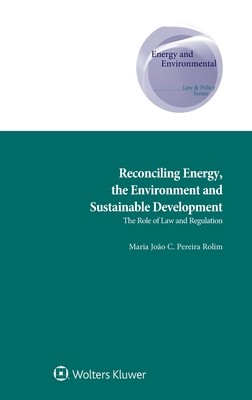
- Išsiųsime per 10–14 d.d.
- Autorius: Maria João C Pereira Rolim
- Leidėjas: Kluwer Law International
- ISBN-10: 9403514612
- ISBN-13: 9789403514611
- Formatas: 16 x 24.9 x 2.3 cm, kieti viršeliai
- Kalba: Anglų
- Extra -15 % nuolaida šiai knygai su kodu: ENG15
Reconciling Energy, the Environment and Sustainable Development + nemokamas atvežimas! | knygos.lt
Atsiliepimai
Aprašymas
Challenged by sustainability imperatives, the world faces a transition in how it uses and produces energy. Yet, despite the indisputable interdependence between energy and the environment, law in these two areas has developed separately, with little consideration for how the logic and aims of each might be reconciled. This innovative book addresses this crucial nexus, exploring the role that law must inevitably play as the effects of fossil fuel-induced climate change continue to radically affect every aspect of life on Earth.
Focusing on the emerging concept of reflexive regulation, the analysis takes giant steps in paving the way for effective legal engagement in the energy transition process. Issues and topics explored in detail include the following:
- energy's distinctive characteristic as an economic activity that works in a chain;
- relation of physical aspects of energy to its legal and social dimensions;
- main aspects of regulation, environmental law and the concept of sustainability;
- specific security of supply challenges faced by the industry; and
- emergence and worldwide adoption of the environmental impact assessment as a procedural mechanism and its connection with Reflexive Regulation.
The author supports her arguments with detailed and critical examination of the regulation theoretical framework and includes citations of case law, rules and regulations from diverse jurisdictions. A case study on the development of the Brazilian electricity sector - an exemplary case, considering the country's abundance of natural energy resources, industrial efficiency prerogatives, regulatory incentives to ensure investment in supply expansion, and increasing demands in meeting sustainability objectives, all as highlighted by ongoing litigation - illustrates the arguments put forward.
This book makes a substantial contribution to developing a framework aimed at linking potential divergent policy objectives in diverse and distinct interdependent fields. It will be welcomed by energy and environmental lawyers and policy makers, as well as by economists, scholars and other professionals concerned with the meaning of law and regulation in relation to energy, the environment and development, and the possible roles law and regulation may play in a pressing scenario of change.
EXTRA 15 % nuolaida
Kupono kodas: ENG15
Akcija baigiasi už 6d.00:02:49
Nuolaidos kodas galioja perkant nuo 10 €. Nuolaidos nesumuojamos.

- Autorius: Maria João C Pereira Rolim
- Leidėjas: Kluwer Law International
- ISBN-10: 9403514612
- ISBN-13: 9789403514611
- Formatas: 16 x 24.9 x 2.3 cm, kieti viršeliai
- Kalba: Anglų
Challenged by sustainability imperatives, the world faces a transition in how it uses and produces energy. Yet, despite the indisputable interdependence between energy and the environment, law in these two areas has developed separately, with little consideration for how the logic and aims of each might be reconciled. This innovative book addresses this crucial nexus, exploring the role that law must inevitably play as the effects of fossil fuel-induced climate change continue to radically affect every aspect of life on Earth.
Focusing on the emerging concept of reflexive regulation, the analysis takes giant steps in paving the way for effective legal engagement in the energy transition process. Issues and topics explored in detail include the following:
- energy's distinctive characteristic as an economic activity that works in a chain;
- relation of physical aspects of energy to its legal and social dimensions;
- main aspects of regulation, environmental law and the concept of sustainability;
- specific security of supply challenges faced by the industry; and
- emergence and worldwide adoption of the environmental impact assessment as a procedural mechanism and its connection with Reflexive Regulation.
The author supports her arguments with detailed and critical examination of the regulation theoretical framework and includes citations of case law, rules and regulations from diverse jurisdictions. A case study on the development of the Brazilian electricity sector - an exemplary case, considering the country's abundance of natural energy resources, industrial efficiency prerogatives, regulatory incentives to ensure investment in supply expansion, and increasing demands in meeting sustainability objectives, all as highlighted by ongoing litigation - illustrates the arguments put forward.
This book makes a substantial contribution to developing a framework aimed at linking potential divergent policy objectives in diverse and distinct interdependent fields. It will be welcomed by energy and environmental lawyers and policy makers, as well as by economists, scholars and other professionals concerned with the meaning of law and regulation in relation to energy, the environment and development, and the possible roles law and regulation may play in a pressing scenario of change.




Atsiliepimai